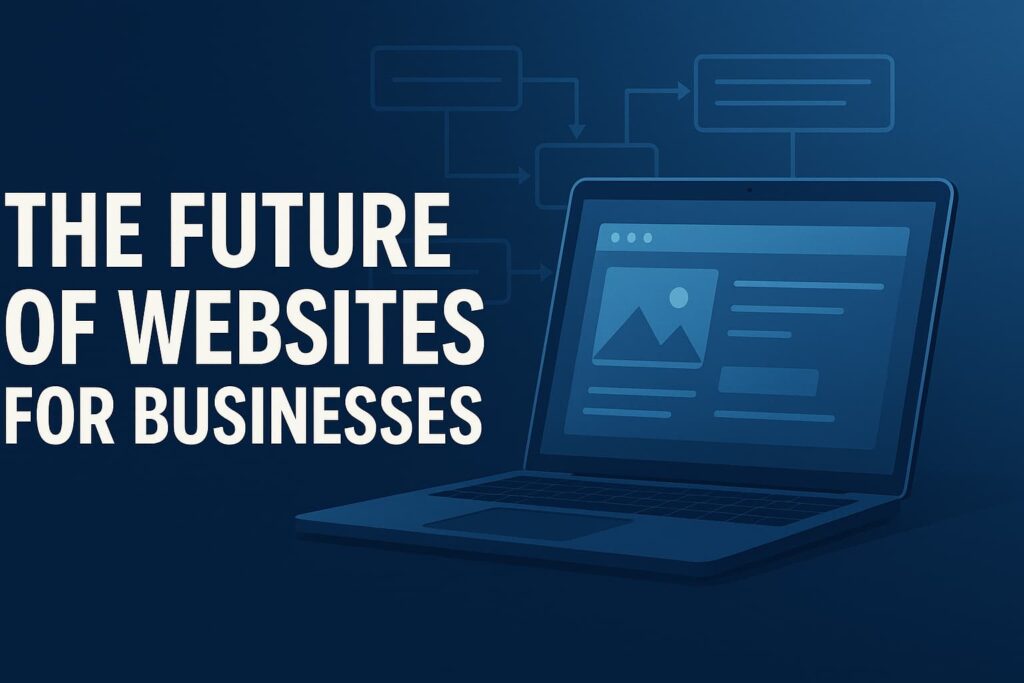The digital world is moving at breakneck speed. Artificial intelligence, automation, new regulations, and evolving customer expectations are changing the rules of the game almost monthly. With so many channels available – social media, AI chatbots, apps, marketplaces – some business owners wonder: Will websites still matter over the next five years?
The answer is a resounding YES. Between 2025 and 2030, websites will not just remain important; they’ll become even more essential to business success. Here’s why.
Websites Remain the Cornerstone of Credibility
Imagine searching for a company and finding no website – only a Facebook page. Chances are, you’d question whether they’re legitimate. That perception will only grow stronger by 2030.
Unlike social platforms, where you’re at the mercy of shifting algorithms and policies, your website is digital real estate you own. It provides a stable, professional anchor that customers can always find. Studies consistently show that consumers view businesses without a website as less trustworthy. Forbes even calls having a website “a non-negotiable” for credibility.
If building trust is your priority, check out our Web Design Services.
The Evolution of WordPress & Web Design
With WordPress powering over 40% of all websites worldwide, it’s worth considering how the platform itself is evolving:
- AI-Driven Design & Content WordPress plugins and site builders are increasingly integrating AI. This means faster content creation, automatic SEO recommendations, and even layouts generated from prompts.
- Full Site Editing (FSE) & Block Themes By 2030, FSE will be standard. Businesses will enjoy drag-and-drop flexibility across every part of their site, removing the need for heavy coding.
- Headless WordPress Expect headless builds – where WordPress handles content but the frontend is powered by React, Vue, or other frameworks – to grow. This allows businesses to deliver seamless omnichannel experiences.
- Performance-Centric Design With Google’s Core Web Vitals becoming increasingly influential, websites will need to be lighter, faster, and cleaner to rank and convert.
For small and medium businesses, this means more power, scalability, and control without enterprise-level costs.
User Experience Will Decide Winners and Losers
By 2030, user experience (UX) won’t be an afterthought – it will determine whether a business thrives or fails. Customers will expect:
- Near-instant load times (under 2 seconds).
- Seamless responsiveness across devices, from desktops to foldable phones.
- Accessibility compliance, ensuring inclusivity for all.
- Personalised content, adapting to user behaviour and preferences.
A well-optimised website won’t just be a digital brochure – it will act like a smart, always-on salesperson.
Protect your site’s performance with our Website Care Plans.
SEO Is Evolving Into “Answer Engine Optimisation”
Search is no longer just about Google. Voice assistants, AI-driven platforms like ChatGPT, and “answer engines” are changing how people discover information. Businesses will need to shift from simply ranking on Google to optimising for multiple discovery platforms.
That means:
- Structured data and schema markup.
- Content that demonstrates E-E-A-T (Experience, Expertise, Authoritativeness, Trustworthiness).
- Voice search optimisation, using conversational language.
- Personalised content, adapting to user behaviour and preferences.
Websites that ignore this will become invisible in an AI-first search world.
Secure your rankings with our SEO Services.
For a deeper dive into the changing search landscape, Search Engine Journal provides insights into how AI is reshaping SEO.
Security, Privacy & Trust Will Be Non-Negotiable
Between 2025 and 2030, privacy and security expectations will skyrocket. Customers will demand visible trust signals:
- SSL certificates.
- Transparent cookie policies.
- GDPR and local compliance (Australia is strengthening its Privacy Act).
- Secure, seamless payment systems.
Failing to meet these standards won’t just harm rankings; it will scare customers away. As Wired highlights, cybersecurity isn’t just a tech issue anymore – it’s a core business risk.
Ecommerce & Multichannel Integration
The role of websites as central hubs will expand:
- Ecommerce growth: Online shopping continues to surge, and businesses will expect their sites to integrate with shipping, payment, and CRM tools.
- Social commerce: Sites will link seamlessly with Instagram, TikTok, and emerging platforms to capture more buyers.
- Customer portals: From bookings to subscriptions, websites will handle more personalised services.
Build a strong foundation with Australian Web Hosting.
Emerging Trends Businesses Should Watch
- 1. Sustainability in Web DesignGreen hosting and lightweight sites will matter as businesses adopt eco-friendly values. Customers may even prefer brands that demonstrate sustainable digital practices.
- 2. Hyper-PersonalisationAI-driven websites will adapt content, offers, and even layouts in real time, tailoring experiences to each visitor.
- 3. No-Code and Low-Code DominanceTools like Elementor and Gutenberg will allow more people to create and manage professional websites without developers – but premium agencies will stand out by layering strategy, SEO, and conversion expertise.
- 4. AR & VR ExperiencesExpect more immersive website features, particularly in retail and real estate, where customers can virtually explore products or properties.
- 5. Regulatory PressureGovernments are tightening rules on accessibility, privacy, and digital transparency. Businesses must keep their websites compliant or risk fines.
The Bottom Line
Between 2025 and 2030, websites will remain the backbone of digital strategy. Social media and AI assistants may dominate discovery, but your website is where conversions, credibility, and customer trust are sealed.
- The past decade was about getting online.
- The next decade is about performing online.
Businesses that invest in fast, secure, user-friendly, and SEO-optimised websites will not only survive but thrive. Those who neglect their websites risk irrelevance.
Stay ahead of the curve; book a free strategy call with us today.

